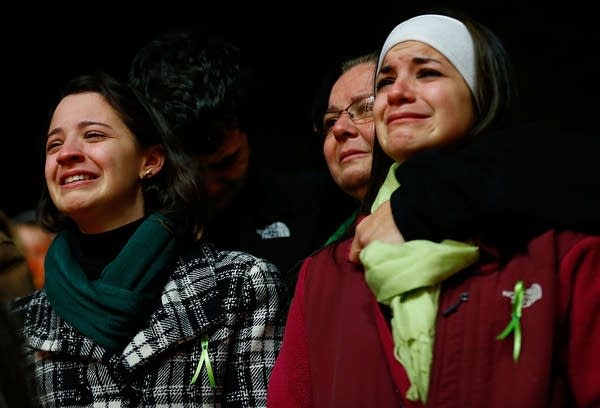Minn. teachers reflect on Newtown, Conn. shooting

We asked Minnesota teachers in MPR's Public Insight Network to share their thoughts following the school shooting in Connecticut on Friday. We've compiled some of their responses below.
"I decided that I would let the students determine whether we discussed the shooting or not. My reasoning was that they are very emotional, and there is no need to add stress to their lives, and, they have seven different classes, so they might be discussing them in other courses. An additional consideration is that many students are immigrants, perhaps refugees, and it is important to think about what topics we discuss, and how challenging or scary those topics might be."
— Tom Odendahl, of Minneapolis, high school economics and current events teacher
Create a More Connected Minnesota
MPR News is your trusted resource for the news you need. With your support, MPR News brings accessible, courageous journalism and authentic conversation to everyone - free of paywalls and barriers. Your gift makes a difference.
"My students are resilient and will continue on. The impact will be great but I think it can be minimized by honoring their need to talk through the events of Friday and by answering their questions to the best of my ability."
— Meg Anderson, of Minneapolis, middle school special education teacher
"I don't worry about [my safety] anymore. I consider it a hazard of the job. I do repeatedly show my students where I want them to hide should there be a problem."
— Ross Reishus, of Owatonna, K-12 music teacher
"We put on extra locks on all of our doors, and we've always been vigilant about people being on the school property or entering our school, but all of us were extra vigilant after the shootings on Friday. Also we started a policy for late arrivals at our school. Any parents who come late with their children have to call a staff member, not just knock on a door and be let in, they have to actually make a phone call and then the staff member will meet them at the door."
— Megan Durkin, of Northfield, preschool owner and teacher
"Many parents would prefer that their young children in elementary school not be exposed to this information. The faculty would prefer they aren't exposed as well. Some young families might have chosen to share that information with their child, but the school has pre-empted discussion by asking those families to have their children not discuss it with their peers. As a result, children at the school can come to school and socialize and remain shielded from this information and maintain their rosy outlook on the world."
— Caroline Askew, of Minneapolis, school administrator
"It makes us all feel less safe, and the easiest things to do is to crack down on the physical safety aspects of your school. I thinks this makes people feel safer. I would rather see our energy spent on helping get at the cause of these tragedies. Locking the doors of the school may make us feel safe, but it gives us a sense that we need to protect ourselves from something "out there", instead of focusing on the wellbeing of those we have within our walls."
— Peter Sage, of Minneapolis, elementary reading specialist
"I feel that we have a very safe school, but we do live in an area where most students do have access to guns, but the parents are very good about safety and storage of guns. Guns and other weapons are not the problem, it is mental health that should be watched more carefully."
— Steve Wegman, of Sanborn, teacher of grades 7-12
"I believe in the importance of social/emotional learning. I hope that the bully task force created by Mark Dayton and our state legislators will also address the fact that we have one of the worst counselor-to-student ratios in the country. Our public school counselors have too many children in their care, and have to spend too much time reacting to problems, conflicts and crises. They are also asked to be in charge of standardized testing — organizing the rooms, the times, the students with special testing accommodations, and then filing the tests afterwards."
— Jeanne Doyle, of St. Paul, school counselor for grades K-8
"Kids have great ideas. Kids want to be included. They want to strategize on how to keep themselves and each other safe. Many of my students believe in a ban of some kind on assault weapons. However, four of my students talked to me about having no strict gun laws."
— Pam Brinkhaus, of Excelsior, 8th grade science teacher
• Follow Elizabeth Dunbar on Twitter: http://www.twitter.com/edunbarmpr
